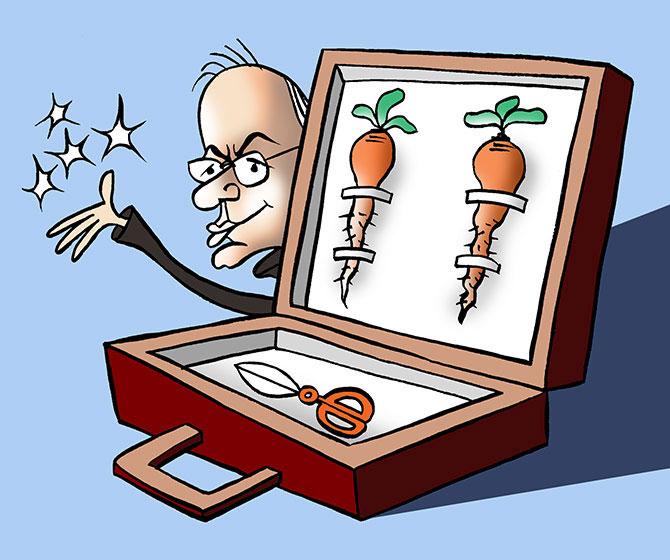The forthcoming Budget, the last full one before the 2019 Lok Sabha elections, is expected to contain a number of sops and feel-good announcements, especially regarding social sector schemes.
Illustration: Uttam Ghosh/Rediff.com

The 2018-19 Union Budget, the first one since the implementation of the Goods and Service Tax (GST), could have a markedly altered structure than the ones before.
Finance Minister Arun Jaitley is expected to table the Budget and present his speech in Parliament on February 1, 2018.
Part B of the speech, which contains tax announcements, is expected to be the shortest till date. This section covers direct and indirect taxes. But, GST has subsumed almost all indirect taxes, leaving only basic Customs duty in the government’s hand.
The reins of the new indirect tax regime are with the GST Council, whose decisions from now till the Budget will have a bearing on the Centre’s tax revenue budgeted estimates for 2018-19.
“Within a few years, the GST rates will be stabilised. But for now, there are many corrections and tweaks to be done for various items and goods.
"Hence, the revenue department will keep track of all that before projecting its central GST (CGST) estimates for the Budget,” a senior government official told Business Standard.
Essentially, GST Council meetings held before the Budget documents go for printing, in the finance ministry’s underground press, could have some bearing on the CGST projections.
Sources said there are some 150 items in what is called the “fitment list”. These are the items in which officials might recommend the GST Council to tweak or correct rates.
Officials said a shorter Part B in the speech could leave room for a bigger Part A if the finance minister and his Budget team decide.
Part A deals with schemes, expenditure, programmes, sops, infrastructure, social sector, macroeconomic trends, fiscal forecasts, banking and capital markets.
The new Budget will be the last full one before the 2019 Lok Sabha elections. Hence it is expected to contain a number of sops and feel-good announcements, especially regarding social sector schemes.
Another official said it could lay down Prime Minister Narendra Modi’s vision beyond 2019 as well.
While Budget preparations have just begun, the second official conceded a longer Part A could provide room for a number of announcements on the rural and agricultural sectors, lower middle class, education, health care, and other such issues.
The ministry had last week issued a circular to begin the process of drafting the Budget for 2018-19.
While no date was given as to when Jaitley would table the Budget in Parliament, the document stated the final estimates for schemes and other expenditures should be decided by January 15, 2018. This suggests the Budget might be presented on February 1.
The circular stated that the advance gross domestic product estimates from the chief statistician’s office were expected by January 6, and the demand for grants was expected to be finalised by January 25.
Pre-Budget meetings with various central government ministries and departments, as well as industry bodies and civil society interest groups, might start from October.
The 2018-19 Budget will be the second one after Railway Budget and Union Budget were merged, and spending classification changed to revenue and capital expenditure from the erstwhile Plan and Non-Plan expenditure.
| How the new Budget will roll out |
|











